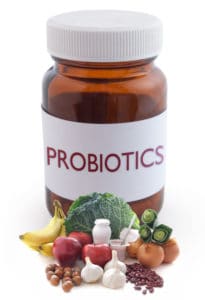(The following is an adapted excerpt from my eBook)
The digestive tract houses 100 trillion microbes. This is referred to as the microbiome. These bugs have tremendous influence over our health and mood. We hope that in our microbiome there are more good than bad bugs. Simply put, if the bugs are good we are healthy and happy, if they are bad we suffer. There isn’t a health condition to which the microbiome isn’t linked. Seriously. (some examples: anxiety/depression, ADHD, Autism, IBS, IBD, Parkinson’s, Chronic Fatigue, Fibromyalgia, All autoimmune diseases, eczema/psoriasis). If you have a health condition, your gut may need a full overhaul, not just probiotics and prebiotics as outlined below.
Most of us have heard of probiotics. The research on probiotics is overwhelmingly strong and positive. You can ingest probiotics in a pill form. This is a good option for anyone. But especially those who have histamine intolerance or Candida overgrowth or some other condition where eating fermented foods is a bad idea. Make sure your probiotic is a reputable brand (which guarantees to have in it what it says it has in it). The best brands can be bought through Wellevate, create an account and shop away!
In this blog post I wanted to just touch upon the foods that are good for our microbiome.
Fermented foods:
Fermented foods have probiotics in them. Some foods were produced with live probiotics (such as yogurt), make sure these say “active live cultures”. Some foods are fermented with whatever wild bacteria are on the original vegetable (sauerkraut). These need to be found in the refrigerated section and not be pasteurized.
Examples of fermented foods:
- acidophilus milk
- buttermilk
- cheese (aged)
- fermented meats
- fermented vegetables
- fermented grains
- kefir
- kimchi
- kombucha
- kvass
- miso
- natto
- pickled vegetables (raw)
- raw vinegars
- sauerkraut
- sour cream
- tempeh
- yogurt (plain, no added sugar, active cultures)
Prebiotic foods
Prebiotics are fibers that feed the beneficial probiotics in your gut. These are helpful to feed the good so they can proliferate. Sometimes prebiotics are added to foods (bars, probiotic supplements, etc). These are: galactooligosaccharides (GOS), fructooligosaccharides (FOS), oligofructose (OF), chicory fiber, or inulin.
Foods we find prebiotics in:
- Asparagus
- Apples
- artichokes
- banana
- berries
- black beans
- cherries
- dandelion greens
- chicory root
- chickpeas
- eggplant
- endive
- flaxseeds
- garlic
- honey
- jerusalem artichokes (sunchokes)
- jicama
- kefir
- kiwis
- leafy greens
- leeks
- legumes
- lentils
- mangoes
- oatmeal
- onions
- peas
- pears
- quinoa
- radicchio
- tomatoes
- white beans
- whole grains
- yogurt
Polyphenols:
These are chemical compunds that come from plants. They are used by your gut bacteria to make beneficial substances. These chemical compounds have names such as flavanones, isoflavones, flavonols, anthocyanins, flavones.
Foods that we find them in:
- cloves
- cocoa powder
- flaxseed meal
- dried sage
- berries
- pomegranate
- apples
- hazelnut
- dried peppermint
- dried rosemary, dried thyme
- grapes
- capers
- pecan
- celery seed
- dark chocolate (70% or higher)
- chestnut
- black olives
- plums
- lemons
- tea
How many of these can you eat on a regular basis?
For more help on how to get the best gut you can, read my eBook!

